Factory Tour
The Ultimate Guide to Choosing a 48v Golf Cart Lithium Battery for Your Next Adventure
 As outdoor activities and leisure sports continue to gain popularity among consumers, the demand for
efficient and powerful energy solutions has surged significantly. In the golf cart industry, the transition from traditional
lead-acid batteries to advanced
lithium options is becoming increasingly clear. A report by the
International Renewable Energy Agency highlights that
lithium-ion battery technology is expected to dominate the market, driven by its superior performance, longevity, and environmental benefits. Specifically, the
48v Golf Cart Lithium Battery has emerged as a top choice, offering enhanced energy density and a longer lifespan than its lead-acid counterparts.
Industry data reveal that golf carts outfitted with lithium batteries can deliver up to
60% more driving range on a single charge, making them ideal for
extended outings on the course. As adventurers seek greater efficiency and sustainability, understanding how to choose the right
48v Golf Cart Lithium Battery becomes essential for maximizing enjoyment and performance in their next adventure.
As outdoor activities and leisure sports continue to gain popularity among consumers, the demand for
efficient and powerful energy solutions has surged significantly. In the golf cart industry, the transition from traditional
lead-acid batteries to advanced
lithium options is becoming increasingly clear. A report by the
International Renewable Energy Agency highlights that
lithium-ion battery technology is expected to dominate the market, driven by its superior performance, longevity, and environmental benefits. Specifically, the
48v Golf Cart Lithium Battery has emerged as a top choice, offering enhanced energy density and a longer lifespan than its lead-acid counterparts.
Industry data reveal that golf carts outfitted with lithium batteries can deliver up to
60% more driving range on a single charge, making them ideal for
extended outings on the course. As adventurers seek greater efficiency and sustainability, understanding how to choose the right
48v Golf Cart Lithium Battery becomes essential for maximizing enjoyment and performance in their next adventure.
Understanding the Advantages of Lithium Batteries Over Lead-Acid for Golf Carts
When considering a 48v golf cart lithium battery for your next adventure, it's essential to understand the benefits lithium batteries offer over traditional lead-acid solutions. Lithium batteries are known for their superior energy density, allowing them to provide more power in a smaller footprint, significantly reducing the weight and space required in golf carts. According to industry reports, the global golf cart battery market is projected to grow, with lithium batteries gaining market share due to their efficiency and longevity. As of 2024, the market is valued at approximately $149.9 million and is expected to witness a compound annual growth rate (CAGR) of 5.4% through 2034.
In contrast, lead-acid batteries, while still dominating the market at 67.3% due to their affordability, are being re-evaluated in the face of evolving technology. Recent interest in lead-acid batteries stems from their cost-effectiveness and established market presence, particularly for entry-level applications. However, advancements in lithium technology continue to push the boundaries of performance, offering faster charging times and a longer lifespan. As the golf cart battery market approaches a valuation of $2.5 billion by 2034, the advantages of lithium batteries are becoming increasingly hard to ignore for users seeking reliable and efficient power solutions for their outdoor adventures.
Key Factors to Consider When Selecting a 48v Lithium Battery for Maximum Performance
When selecting a 48v lithium battery for your golf cart, several key factors can significantly influence performance and overall satisfaction. First and foremost, consider the battery's capacity measured in amp-hours (Ah). A higher capacity means longer run times, enabling you to enjoy extended adventures without the worry of frequent recharging. Additionally, look for batteries with a solid energy density, as this directly impacts the weight of the battery and, consequently, the efficiency and speed of the golf cart.
Another important aspect is the battery's discharge rate, which determines how quickly the battery can deliver power when needed. A battery with a high discharge rate ensures that your golf cart performs optimally, especially during steep inclines or when carrying heavy loads. Moreover, pay attention to the battery's lifespan and warranty. Opting for a model with a longer lifespan and comprehensive warranty can save you money and hassle in the long run, ensuring that your investment provides reliable power for many adventures to come.
The Ultimate Guide to Choosing a 48v Golf Cart Lithium Battery
Understanding key performance metrics can help you select the best lithium battery for your golf cart adventures. The following chart illustrates the key factors to consider when choosing a 48v lithium battery.
Comparative Analysis of Battery Lifespan and Cycle Durability in Lithium vs. Traditional Batteries
When choosing a 48v golf cart lithium battery for your next adventure, understanding the comparative analysis of battery lifespan and cycle durability between lithium and traditional batteries is crucial. Lithium batteries typically offer a lifespan of 2,000 to 5,000 cycles, compared to only 500 to 1,500 cycles for traditional lead-acid batteries. According to a report by the Battery University, this translates to lithium batteries lasting up to 10 years or more with proper maintenance, while traditional batteries might need replacement every 3 to 5 years.
Furthermore, lithium batteries perform better under various conditions, maintaining a consistent output even as their charge depletes. This efficiency is essential for long golfing days where reliability matters. Data from the National Renewable Energy Laboratory highlights that lithium batteries can operate effectively over a wider temperature range, adding to their durability and longevity.
Tips: To maximize the life of your lithium battery, ensure it is charged appropriately and avoid deep discharges. Additionally, consider investing in a battery management system to monitor performance and enhance safety. Lastly, always choose batteries from reputable manufacturers to ensure quality and reliability during your golfing adventures.
Examining the Cost-Effectiveness of Investing in a Lithium Battery for Long-Term Use
Investing in a lithium battery for your golf cart may seem like a hefty upfront cost, but the long-term benefits can outweigh the initial expenses significantly. With a lifespan that often exceeds traditional lead-acid batteries, lithium options typically last up to 10 years or more with proper maintenance. This translates to fewer replacements and lower overall costs over time. Additionally, lithium batteries offer improved energy efficiency, allowing you to travel further on a single charge, which can be especially cost-effective for frequent golfers or those using carts for extended adventures.
**Tip: When considering your investment, assess your typical usage and charging habits.** If you often find yourself needing to charge the battery frequently, a lithium battery can save you time and money. Another important aspect is the weight consideration; lithium batteries are generally lighter, enhancing the golf cart’s performance and reducing energy consumption.
**Tip: Look for warranties that cover at least five years when purchasing a lithium battery.** A solid warranty can provide peace of mind and assurance of the product’s durability. Ultimately, while the initial price tag may be higher, the cost-effectiveness of lithium batteries becomes apparent over time through savings on maintenance and enhanced performance.
Safety Features and Environmental Impact of Lithium Batteries in Golf Cart Applications
When it comes to choosing a 48v golf cart lithium battery, safety features and environmental impact play a crucial role. Lithium batteries are known for their lightweight design and high energy density, which not only improves the overall performance of golf carts but also reduces the risk of accidents associated with bulkier batteries. Look for batteries that include built-in protection systems against overcharging, short circuits, and temperature fluctuations. This ensures that your battery operates safely under various conditions, allowing for a worry-free adventure on the course.
Furthermore, the environmental impact of lithium batteries is significant. Unlike traditional lead-acid batteries, lithium options are more efficient and have a longer life span, which contributes to less waste in landfills. Additionally, many manufacturers are adopting sustainable practices in sourcing raw materials and recycling old batteries.
Tips: When shopping for a lithium battery, consider the brand's commitment to sustainability and whether they offer a robust recycling program. Also, check for certifications that validate the safety features of the battery, as this can ensure you are making a responsible and informed choice for both your golf cart and the planet.
Related Posts
-
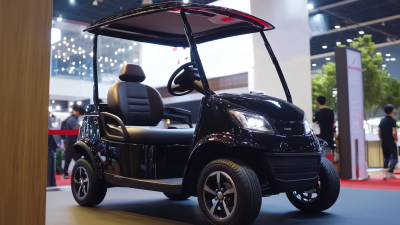
Unveiling the Future of 48v Golf Cart Lithium Battery at the 137th Canton Fair in Guangzhou
-
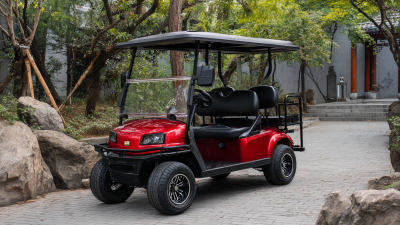
Exploring the Advantages of Choosing the Leading 48v Lifepo4 Golf Cart Battery for Your Business
-
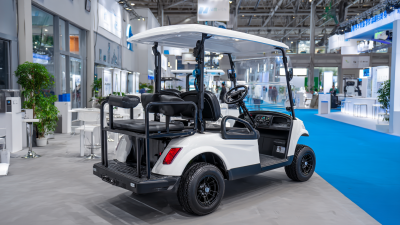
Exploring Market Trends for 48V Golf Cart Lithium Batteries at the 138th Canton Fair 2025
-
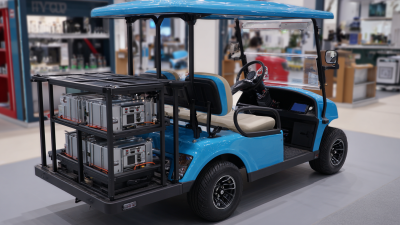
Innovative Trends in 48v Lifepo4 Golf Cart Battery Technology at the 2025 China Import and Export Fair
-
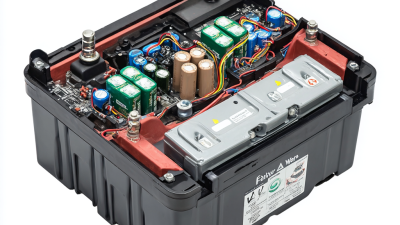
Explore Reliable Quality: The Best 72v Golf Cart Battery from China for Global Buyers
-
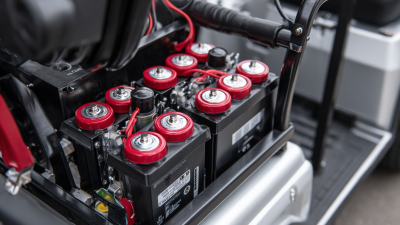
Unleashing Performance: Best Practices for 48V Golf Cart Battery Pack Optimization







